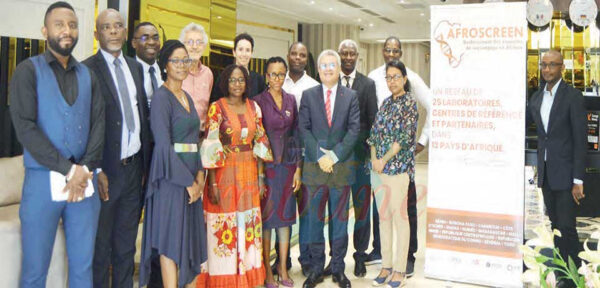Pasteur Network Epidemiology Workshop in Yaoundé, March 28-30, 2023
Pasteur Network Epidemiology Workshop in Yaoundé, March 28-30, 2023
The Centre Pasteur du Cameroun (Yaoundé), a member of the Pasteur Network, organized from March 28 to 30, 2023 the “Consultation Workshop for a methodology for sustainable surveillance of epidemics beyond COVID-19”. This workshop brought together the group of epidemiology experts of the Pasteur Network involved in the AFROSCREEN project.

The AFROSCREEN project is a capacity building program for genomic surveillance of the evolution of SARS-CoV-2 variants, supported by a sentinel surveillance component. The project structures a network of 25 laboratories, reference centers and partners in 13 African countries: Benin, Burkina Faso, Cameroon, Central African Republic, Côte d’Ivoire, Democratic Republic of Congo, Ghana, Guinea, Madagascar, Mali, Niger, Senegal and Togo.
In the long term, the AFROSCREEN project aims to consolidate technological platforms by structuring a permanent network for monitoring emerging pathogens in Africa, thus meeting the “One Health – Global Health” challenges.
This meeting was held within the framework of epidemic preparedness strategies with the general objective of reinforcing alert capacities, and therefore surveillance, with, in particular, an essential activity of follow-up of family contacts of severe cases for which it was not possible to have an etiological diagnosis or with an infection by a new pathogen.
Funded by the French Development Agency (AFD) within the framework of the Health in Common initiative, the AFROSCREEN project is coordinated by ANRS | Emerging Infectious Diseases (ANRS | EID). It is implemented by a consortium of three partner research institutions: ANRS | MIE, the Institut de recherche pour le développement (IRD) and the Institut Pasteur.
The Centre Pasteur du Cameroun hosts the regional coordination unit of the AFROSCREEN project for the Pasteur Network.
Reference and public health laboratory, the Centre Pasteur du Cameroun is a public institution, member of the Pasteur Network. Its mission is to contribute to the fight against disease and the promotion of health, through the care of patients and the prevention of international health risks by monitoring endemic and epidemic diseases, scientific research and the training of health personnel.
The AFROSCREEN project is a capacity building program for genomic surveillance of the evolution of SARS-CoV-2 variants, supported by a sentinel surveillance component. The project structures a network of 25 laboratories, reference centers and partners in 13 African countries: Benin, Burkina Faso, Cameroon, Central African Republic, Côte d’Ivoire, Democratic Republic of Congo, Ghana, Guinea, Madagascar, Mali, Niger, Senegal and Togo.
In the long term, the AFROSCREEN project aims to consolidate technological platforms by structuring a permanent network for monitoring emerging pathogens in Africa, thus meeting the “One Health – Global Health” challenges.
This meeting was held within the framework of epidemic preparedness strategies with the general objective of reinforcing alert capacities, and therefore surveillance, with, in particular, an essential activity of follow-up of family contacts of severe cases for which it was not possible to have an etiological diagnosis or with an infection by a new pathogen.
Funded by the French Development Agency (AFD) within the framework of the Health in Common initiative, the AFROSCREEN project is coordinated by ANRS | Emerging Infectious Diseases (ANRS | EID). It is implemented by a consortium of three partner research institutions: ANRS | MIE, the Institut de recherche pour le développement (IRD) and the Institut Pasteur.
The Centre Pasteur du Cameroun hosts the regional coordination unit of the AFROSCREEN project for the Pasteur Network.
Reference and public health laboratory, the Centre Pasteur du Cameroun is a public institution, member of the Pasteur Network. Its mission is to contribute to the fight against disease and the promotion of health, through the care of patients and the prevention of international health risks by monitoring endemic and epidemic diseases, scientific research and the training of health personnel.